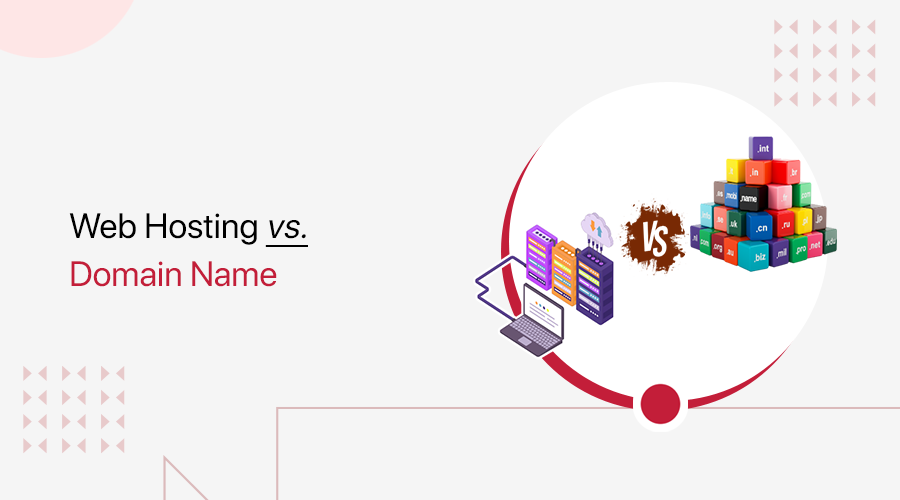
Are you figuring out how to choose a domain name for your business? If yes, then stay right here!
A domain name is one of the first things users see on your website, making the first impression on your business. Hence, choosing a domain name is the most crucial step for establishing your brand.
Moreover, you must carefully select the right domain name to drive traffic and promote your business. But coming up with the perfect domain name can be difficult if you don’t know the things to consider.
No need to be concerned! This article shows various tips to help you choose a domain name for your business. With that, you’ll have a catchy domain that reflects your brand.
Now, buckle up, and let’s begin!
What is a Domain Name? Why is it Important for Your Business?
Before moving right into the guide, let’s first learn what a domain name is. Plus, let’s check out the significance of domain names on business websites.
A domain name (or shortly domain) is the unique name of your website. With a distinct domain, everyone on the web can identify and distinguish your site from others.
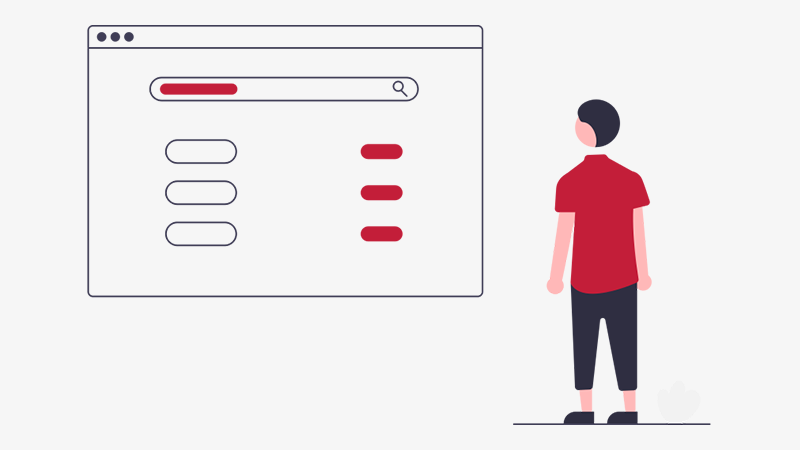
Moreover, it serves as the site’s online address, similar to a house’s physical address. So, when a user types a domain name into their web browser, the respective website shows up.
For example, ‘SiteNerdy.com’ is the domain name of our website. With this name, our site can be identified by users on the internet. Plus, this address lets all users access our website after they type it into their web browser’s address bar.
Furthermore, a domain name contains 2 components. They are:
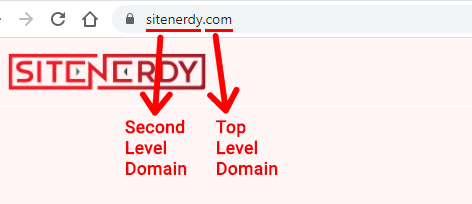
- Second-Level Domain (SLD): SLD is the initial part of the domain name that you register to identify your brand, business, or website.
- Here, ‘SiteNerdy’ is the SLD of our domain, ‘SiteNerdy.com’.
- Top-Level Domain (TLD): It’s the extension of the domain name that comes after the SLD. It defines the location or aim of your site.
- Here, ‘.com’ is the TLD on our domain, ‘SiteNerdy.com’.
In this article, we’ll help you choose both SLD and TLD to make a domain name for your business website.
Why is a Domain Name Important for Your Business?
Moving forward, let’s check out the list below to learn the significance of a domain in your business:
- A domain name gives the first impression of your website and business. So, a good domain name can make a positive and lasting impression.
- Also, it helps in branding your business. It lets users differentiate your business from your competitors, improving brand recognition.
- A memorable domain name helps users find or revisit your website. Plus, it builds brand awareness and serves as your business identity.
- Using a unique domain avoids legal disputes and trademark conflicts.
- Adding keywords to your domain can help your website have a higher SEO ranking (Search Engine Optimization).
With that, let’s jump right into the main topic of interest!
How to Choose a Domain Name for Your Business (12 Tips to Follow)
Now, we know how vital a domain name is for the overall growth of a website and business. So, you must carefully choose the right domain name for your business.
Hence, here are the 12 tips to consider while selecting a domain name for your business. Make sure to keep them in mind and use a perfect domain!
1. Use the Right Domain Name Extension
We know there are 2 components of a domain name. One is the Top-Level Domain (TLD), the extension for your domain name. The extension is the suffix at the end of your domain.
Hence, the first and foremost thing to consider is using the best extension for your domain name. And there are hundreds of TLDs available. But which extension should you select?
The extension you should choose depends on various factors. The major factor is the purpose and audience of your business and website.
If you aren’t sure, then look at the most popular generic extensions you can consider below:
| Extension | Full Form | Used For | Example | Specialization |
| .com | Commercial | General commercial purposes | SiteNerdy.com | A blog website for WordPress tutorials. |
| .net | Network | Technical and Infrastructural sites | SlideShare.net | A networking site for knowledge sharing. |
| .org | Organization | Non-commercial and non-profit organizations | WordPress.org | An open-source platform for building websites. |
| .gov | Government | Reserved for the US government agencies | WhiteHouse.gov | A website about the administration of the US government. |
| .co | Company | Ideal for company, commerce, or community sites | DailyMail.co.uk | A website of a news company in the UK. |
| .edu | Education | Educational institutes | Harvard.edu | The official website of Harvard University. |
Among all these extensions, .com, .net, and .org are the most recognizable. And we don’t suggest using the newer extensions that aren’t familiar to users.
Most of all, we recommend choosing the ‘.com’ extension for any website type. As it’s the most established, credible, trustworthy, and memorable extension for your website.
For example, you can see that our website, SiteNerdy, also uses the ‘.com’ extension.

In addition, you can register your domain name with various common extensions. With that, it protects your brand from others using the same name on other extensions.
2. Keep Your Domain Short
Generally, a short domain name is best for all businesses. Because visitors can easily find and return to your site.
So, what’s the ideal domain name length? The DomainRegistration.com research states that the most common length of domain names is about 12 characters.
Hence, it’s good to have a 6-14 characters domain. In addition, make sure that the name doesn’t include more than 2 or 3 words.
For instance, the ‘ThemeForest.net’ website has 11 characters on its domain name. Also, it contains 2 words, ‘Theme’ and ‘Forest’. Pretty short yet understandable, isn’t it?
3. Think About Your Keywords
Keywords play a crucial role in your website domain. Using the keywords in your domain name, you can tell search engines about your business. Ultimately, this helps your site to rank higher on search results.
But don’t think about adding the keywords to the domain exclusively. Moreover, you can try using relevant keywords on your domain that precisely describes your business purpose.

However, getting an available domain with your desired keywords can be difficult. So, be creative in combining the words for a proper domain name.
For example, ‘MyThemeShop.com’ is a marketplace for themes. This domain name uses keywords like ‘theme’ and ‘shop’ that make search engines understand its business.
Additionally, you can focus on using low to medium-competitive keywords for your domain. With that, there can be chances of better website ranking.
Check out the best keyword research tools to find the relevant keywords for domain names.
4. Avoid Using Hyphens, Numbers, and Double Letters
You must not use hyphens, numbers, and double letters when choosing the domain name for your business. Let’s see why!
Hyphens signify spam domains that no one wants to be associated with. When visitors see a domain using hyphens, they get a bad impression of your website. As they’ll think it’s a spam domain. Hence, this negatively impacts your business.
Plus, domains with hyphens, numbers, and double letters increase the chances of typos. This leads your website to lose potential traffic.

In simpler terms, users can forget that your site has hyphens or numbers on the domain. So, suppose there’s a site with a similar domain without hyphens and numbers. Then, your visitors may end up at your competitor’s site.
Moreover, visitors can forget to add hyphens and numbers of your domain in the correct location. Similarly, domains with repetitive letters like ‘WordPressSetup.com’ are also prone to typos.
Therefore, these are some mistakes you should avoid when selecting your domain name.
5. Use a Domain Name Generator Tool When You’re Stuck
According to Statista reports of 2021, there are over 1.88 billion websites. With time, the number of domains is obviously increasing daily.
Because of so much competition, your domain ideas may be used already. Isn’t it? And manually searching for more domains can take a lot of time.
So, how can you come up with a significant domain name? Worry not! Several domain name generators help you find a unique domain name for your business.
These tools automatically search for available domains based on your keywords and the extension you want. Also, you’ll get more ideas to use the perfect one for your site.
If we had to suggest, then we’d go with Namecheap. It’s a popular tool that lets you enter keywords for your business and the extension you want. Also, it has more filter options like price range. As a result, you’ll get suggested domain names that aren’t registered.
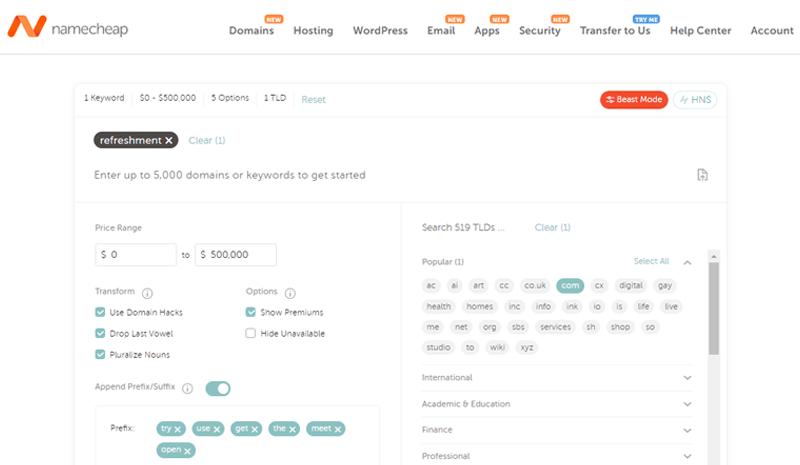
Also, you can use other tools from our list of the best domain name generators.
6. Make it Unique and Brandable
Your domain name is how your audience finds, remembers, and shares your business. So, make a more brandable and unique domain name instead of a generic one.
Moreover, if you can’t add keywords to your domain, then align it with your brand and business. This means your domain name can be your business name or something close. But your brand name shouldn’t be close to any of your competition.
Ultimately, this makes your domain name unique and catchy to target the right audience and stand out.

For instance, ‘BuyClothesOnline.com’ may do well on search engines because of its keywords. However, this is a generic domain name. On the other hand, ‘Amazon.com’ is a much more brandable domain. As an audience, you’ll prefer Amazon.com, won’t you?
7. Research Your Domain Name
Another task you must do is to research the domain name and check its history.
You must find out if there’s already a registered business using the same domain. With a trademark search, you can see businesses with the same or a similar name trademarked. This helps you avoid the risk of copyright infringement.
On top of that, you should also check the past usage of the domain so that there haven’t been any inappropriate or illegal activities.
Hence, having a similar or matching domain can also cause severe legal implications. So, you can use various online tools to check the history and usage.
One of them is the WHOIS lookup tool. It stores information about registered domains, like ownership, contact information, expiration date, etc.
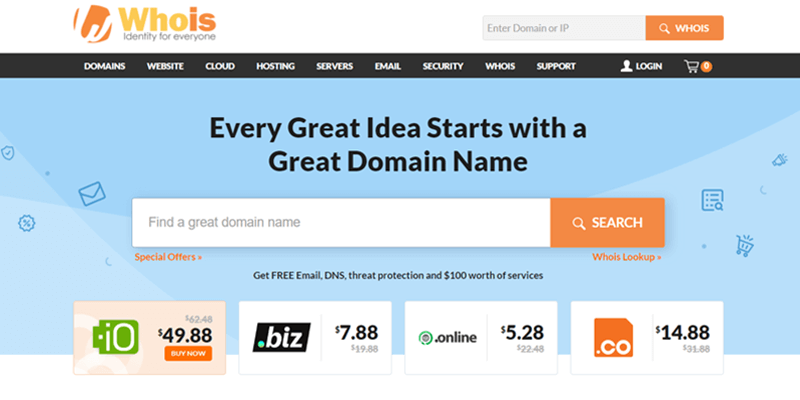
In addition, check if the domain is on any blacklist or spam list. For that, you can use blacklist software like Spamhaus.
8. Check the Domain Availability on all Social Channels
Before you move forward with a domain name, you should also check if it’s available on all social channels. But why? Let’s see!
It’s ideal to use the same name on your domain and social networks. This makes the users familiar with your business everywhere on the internet.
Hence, connecting your domain name with your social media accounts establishes a social media presence. Ultimately, it helps to build your brand and business.

However, some businesses work only through social media platforms. It means those businesses may not have a website.
Because of that, you must check the social networks and see the availability of the name. So, you can use tools like Knowem. It searches your domain name on 25+ popular social networking sites.
If it’s already taken, then consider altering the domain name. With that, you’ll have a domain name usable on top social media platforms.
9. Make Sure it’s Easy to Type, Pronounce, and Remember
We’ve already mentioned that your domain name shouldn’t contain hyphens, numbers, and double letters. All of that is to make sure it’s easy to type, pronounce, and remember.
Apart from making those mistakes, your domain name must be easy to spell for any user. Also, it should be easy when used for speaking and writing.
Because users from different places and ages may come across your business. So, you can’t use any complicated terms on the domain. The best way is to perform tests with your colleagues and see if it fulfills these criteria.
On top of that, remember to not register a domain name having incorrect spelling. If you’re not using an accurately spelled domain, then how can you think your users can?
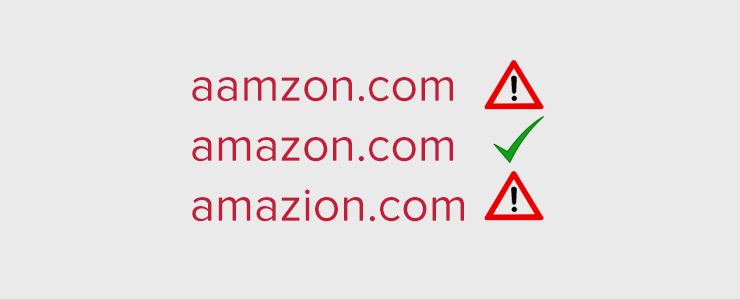
10. Think Long-Term
Thinking about registering a domain name now? Nope! You should step back and see if your domain can be used long-term.

Suppose your business aims to optimize clients’ websites for SEO. Then, you may have thought of the domain to be ‘OptimizedSEO.com’.
However, if your business can expand in the future with other digital marketing services like email marketing. Then, you might want to reconsider your domain name.
You can indeed change the domain if you want after your site is live. But it’ll add confusion to your customers looking for your site. Plus, changing the name costs you extra money and difficulties in SEO rankings.
To be exact, you’ve to buy a new domain and redirect your site to that domain. Further, you’ll have to update your marketing materials and notify your users about the change. Quite tiresome, isn’t it?
Therefore, choose a domain name that’ll remain relevant as your business grows. Right now!
11. Target Your Business Area
Suppose you own a local business and don’t want to grow geographically. Then, you can consider adding your city/state name to the domain. For example, ‘GeorgiaPlumbing.com’.
With that, it’ll be easy for local customers to find and remember your business. Plus, there won’t be unexpected visitors to your site that don’t fall into your target demographic.

Moreover, many domain registrars let you get the geoTLD (Geographic TLD) for your domain name. So, your domain extension can have the name of your location instead.
Similarly, if you have a country-specific business, then you can use the ccTLD (Country-code TLD) extension. Some ccTLD extensions are .uk, .de, .au, etc.
12. Quickly Register it Before Others
Each day, thousands of new domain names are registered from all around the world.
If you’ve come up with the most suitable domain name for your business, then don’t wait. Because if you don’t act fast, then someone may register the same domain before you.
Hence, we suggest you quickly register the domain name once you’re sure. And this concludes our 12 helpful tips on how to choose a domain name for your business.

If you’re unsure where to get a domain name, then we’re there to help. Move forward with our further sections to know!
Top 3 Domain Registrars for Affordable Domain Name Registration
The last tip for choosing a domain name for your business says to quickly register it before others. But where shall you register a domain name and make it all yours?
That’s when a domain register comes into play! A domain name register sells domains, making it easy for you to register one for your business.
Additionally, many domain registrars are in the market. They let you search for an available domain name, select the best extension, and get pricing information to buy the domain.
To help you out, here are the top 3 domain registrars with affordable domain registration services. So, go through them and grab the best deal for your business.
1. Namecheap
Namecheap is an affordable domain registration provider with an additional web hosting service. It has an extensive domain price search tool to look for popular TLDs at the best prices. Also, you’ll get business products and services, like email hosting, logo maker, etc.
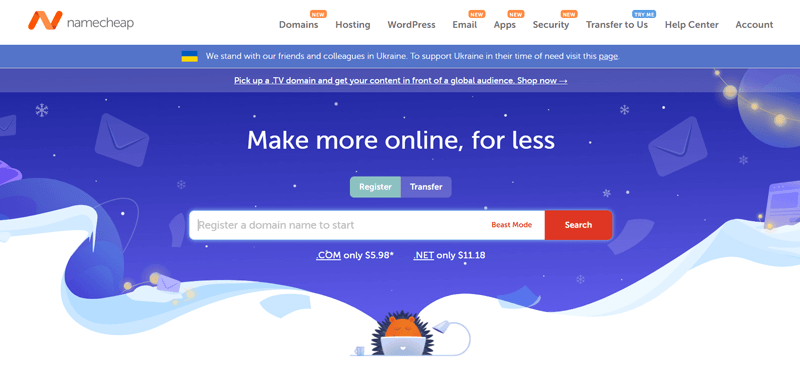
Pricing:
The table below demonstrates the prices for some of the best TLDs:
| Top-Level Domains / Pricing | .com | .co | .net | .org |
| Registration Price (Per Year) | $9.58 | $4.98 | $11.18 | $7.48 |
| Renewal Price (Per Year) | $14.58 | $28.98 | $14.98 | $14.98 |
| Transfer Price (Per Year) | $9.78 | $24.98 | $11.18 | $10.98 |
2. GoDaddy
GoDaddy is a popular all-in-one domain registrar and web hosting platform for businesses. Its domain registration service lets you choose from 500+ extensions. Also, you’ll get a professional email and online marketing tools to strengthen your brand and business.
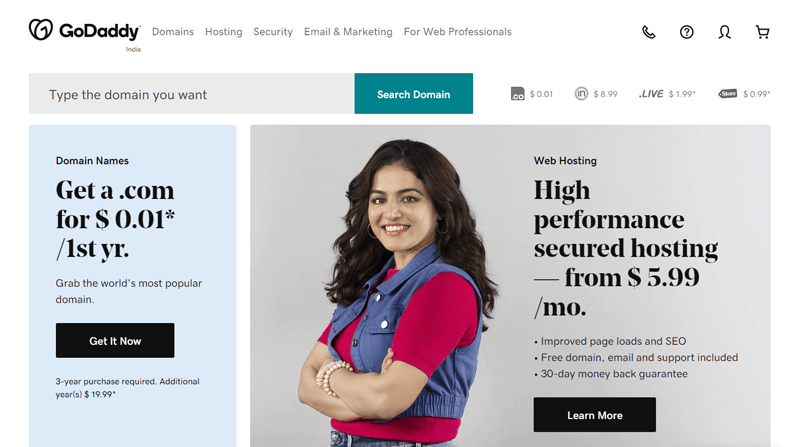
Pricing:
Check out the table below and find the prices of popular extensions in GoDaddy:
| Top-Level Domains / Pricing | .com | .site | .one | .org |
| Registration Price (1 Year) | $0.01 | $0.99 | $5.99 | $9.99 |
| Renewal Price (Per Year) | $19.99 | $39.99 | $25.99 | $20.99 |
3. Domain.com
Another well-known domain name registrar ideal for small businesses is Domain.com. This platform provides an extensive set of TLDs and ccTLDs. Moreover, you can also use its site builder, marketing tools, etc., to boost your business.
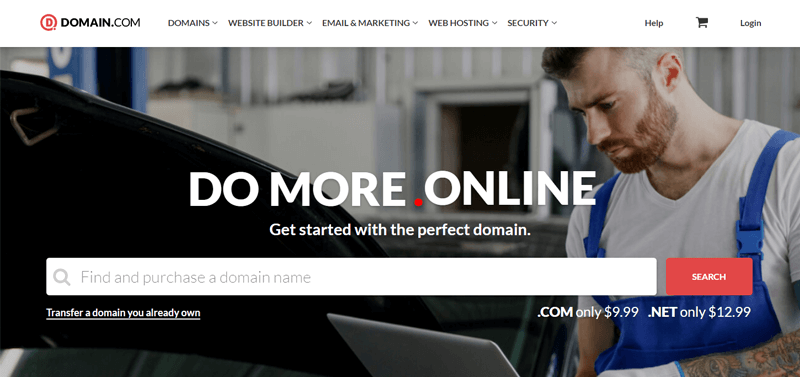
Pricing:
Now, let’s look at the cost of domain extensions on Domain.com.
| Top-Level Domains / Pricing | .com | .me | .net | .blog | .org |
| Registration Price (1st Year) | $9.99 | $3.99 | $12.99 | $6.99 | $8.99 |
| Renewal Price (2nd Year) | $20.98 | $23.98 | $25.98 | $34.98 | $23.98 |
| Renewal Price (3rd Year) | $31.97 | $43.97 | $38.97 | $62.97 | $38.97 |
| Renewal Price (4th Year) | $42.96 | $63.96 | $51.96 | $90.96 | $53.96 |
| Renewal Price (5th Year) | $53.95 | $83.95 | $64.96 | $118.95 | $68.95 |
These are only a few of the domain registrars we recommend using. To learn more, here’s our list of the popular and best domain name registrars.
Top 3 Cheap Web Hosting Providers with Free Domain Name Registration
Have you decided on the web hosting platform or domain registrar you’ll use for your website? If not, then read this!
For beginners, first, learn the differences between web hosting vs domain here. Then, our guide on how to choose a web hosting company.
Thankfully, many web hosting providers offer a free domain name registration service on their plans. So, instead of getting a premium domain, why not get it free?
But there can be some restrictions on such domains. Hence, choose a reliable web host with ideal domains for your business. And we’re to help you!
The list below has the best cheap web hosting services with free domain name registration. Now, let’s jump right into it!
1. Bluehost
Bluehost is one of the cheapest web hosting platforms for all business types. Every plan on Bluehost lets you add a free domain and SSL (Secure Socket Layer) certificate. Plus, higher plans also offer free domain privacy and other security features.
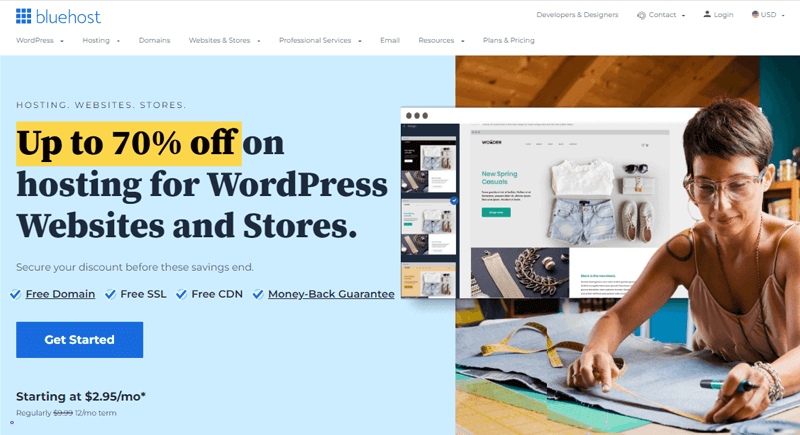
Pricing:
These are the pricing plans present in the shared hosting solution of Bluehost. Also, check the availability of free domain names on these plans.
| Plans / Features | Basic | Plus | Choice Plus | Pro |
| Initial Cost | $2.95/month | $5.45/month | $5.45/month | $13.95/month |
| Renewal Cost | $10.99/month | $14.99/month | $19.99/month | $28.99/month |
| No of Websites | 1 | Unlimited | Unlimited | Unlimited |
| SSD Storage | 10 GB | 20 GB | 40 GB | 100 GB |
| Free Domain | 1 year | Yes | Yes | Yes |
Do you want a web hosting platform better than Bluehost? Then, here’s a list of the best Bluehost alternatives.
2. Hostinger
Another web hosting platform offering various kinds of hosting solutions is Hostinger. Some solutions include cloud, eCommerce, etc. Moreover, you can get a free domain registration service on most plans. Also, it provides free SSL certificates for your websites.
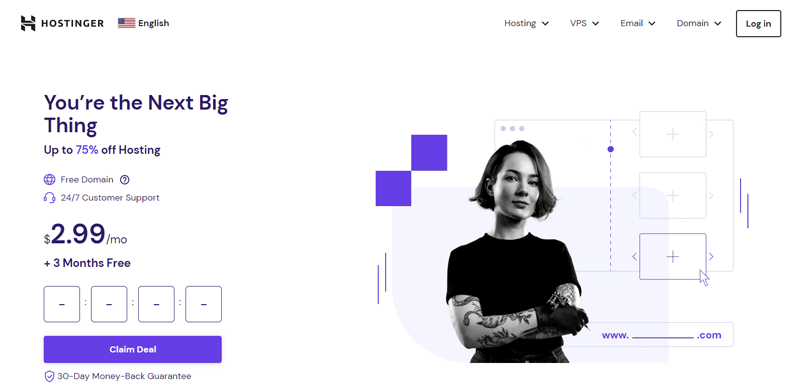
Pricing:
The table below shows the web hosting pricing plans of Hostinger ideal for small to medium businesses. Plus, look at the plans having a free domain registration service.
| Plans / Features | Single | Premium | Business |
| Initial Cost | $1.99/month | $2.99/month (2 months free) | $3.99/month (2 months free) |
| Renewal Cost | $3.99/month | $6.99/month | $8.99/month |
| No. of Websites | 1 | 100 | 100 |
| Bandwidth | 100 GB | Unlimited | Unlimited |
| SSD Storage | 30 GB | 100 GB | 200 GB |
| Free Domain | No | Yes | Yes |
Are you looking for a more competitive platform than Hostinger? Then, go through our list of the best Hostinger alternatives.
3. DreamHost
DreamHost is an all-in-one web hosting provider with various free integrated features. It has a free domain registration service. Plus, you’ll also get professional email addresses, privacy protection, and SSL security for your website.
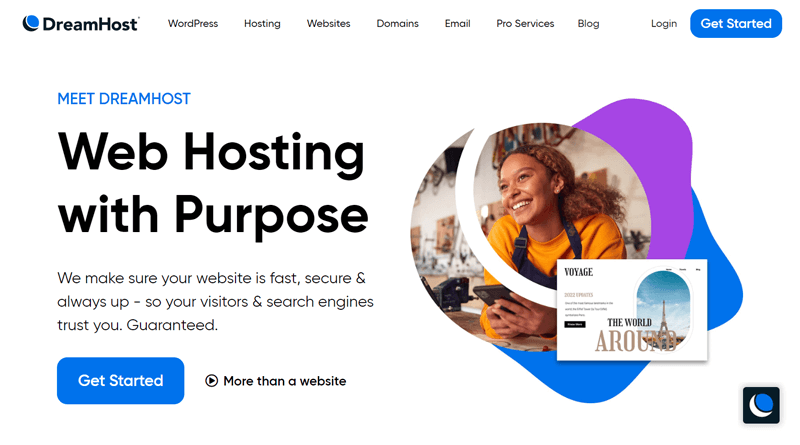
Pricing:
Now, let’s see the pricing plans of DreamHost when selecting the shared hosting solution. Also, look out for the domain registration service they provide.
| Plans / Features | Starter | Unlimited |
| Initial Cost (Per Month) | $4.95 | $8.95 |
| Initial Cost (Per Year) | $2.95 | $2.95 |
| Initial Cost (3-Year Term) | $2.59 | $3.95 |
| No. of Websites | 1 | Unlimited |
| SSD Storage | 50 GB | Unlimited |
| Bandwidth | Unlimited | Unlimited |
| Free Domain | Free for 1-year and 3-year plans | Free for 1-year and 3-year plans |
| Subdomains | 5 | Unlimited |
There are several web hosting platforms offering domain registration better than DreamHost. Check them out from our blog on the best DreamHost alternatives.
Conclusion
That’s it! We’re at the end of this guide on how to choose a domain name for your business. Hope you enjoyed it and agree with our tips!
As said before, using a relevant domain name is vital to boost your brand and business. So, we hope you were able to choose the perfect domain name for your business.
But if you’re still in a dilemma, then no worries! You can get a pre-sale support service before moving ahead with a domain.
Moreover, you can comment with your queries on our post as well. We’ll be more than happy to help you.
In addition, please read our insightful guides. They are on the best blogging and content marketing online courses and the best email marketing services for business.
Lastly, you can follow us on Facebook and Twitter to get updates on new helpful blogs.
